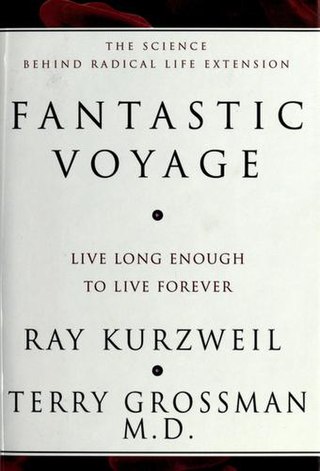Dieting is the practice of eating food in a regulated way to decrease, maintain, or increase body weight, or to prevent and treat diseases such as diabetes and obesity. As weight loss depends on calorie intake, different kinds of calorie-reduced diets, such as those emphasising particular macronutrients, have been shown to be no more effective than one another. As weight regain is common, diet success is best predicted by long-term adherence. Regardless, the outcome of a diet can vary widely depending on the individual.

Human chorionic gonadotropin (hCG) is a hormone for the maternal recognition of pregnancy produced by trophoblast cells that are surrounding a growing embryo, which eventually forms the placenta after implantation. The presence of hCG is detected in some pregnancy tests. Some cancerous tumors produce this hormone; therefore, elevated levels measured when the patient is not pregnant may lead to a cancer diagnosis and, if high enough, paraneoplastic syndromes, however, it is unknown whether this production is a contributing cause or an effect of carcinogenesis. The pituitary analog of hCG, known as luteinizing hormone (LH), is produced in the pituitary gland of males and females of all ages.
A low-protein diet is a diet in which people decrease their intake of protein. A low-protein diet is used as a therapy for inherited metabolic disorders, such as phenylketonuria and homocystinuria, and can also be used to treat kidney or liver disease. Low protein consumption appears to reduce the risk of bone breakage, presumably through changes in calcium homeostasis. Consequently, there is no uniform definition of what constitutes low-protein, because the amount and composition of protein for an individual with phenylketonuria would differ substantially from one with homocystinuria or tyrosinemia.

Diet or light beverages are generally sugar-free, artificially sweetened beverages with few or no calories. They are marketed for diabetics and other people who want to reduce their sugar and/or caloric intake.
Roy Lee Walford, M. D. was a professor of pathology at University of California, Los Angeles School of Medicine, a leading advocate of calorie restriction for life extension and health improvement, and a crew member of Biosphere 2.
Calorie restriction mimetics (CRM), also known as energy restriction mimetics, are a hypothetical class of dietary supplements or drug candidates that would, in principle, mimic the substantial anti-aging effects that calorie restriction (CR) has on many laboratory animals and humans. CR is defined as a reduction in calorie intake of 20% to 50% without incurring malnutrition or a reduction in essential nutrients. An effective CRM would alter the key metabolic pathways involved in the effects of CR itself, leading to preserved youthful health and longer lifespan without the need to reduce food intake. The term was coined by Lane, Ingram, Roth of the National Institute on Aging in a seminal 1998 paper in the Journal of Anti-Aging Medicine, the forerunner of Rejuvenation Research. A number of genes and pathways have been shown to be involved with the actions of CR in model organisms and these represent attractive targets for drug discovery and for developing CRM. However, no effective CRM have been identified to date.

Small for gestational age (SGA) newborns are those who are smaller in size than normal for the gestational age. SGA is most commonly defined as a weight below the 10th percentile for the gestational age. SGA predicts susceptibility to hypoglycemia, hypothermia, and polycythemia. By definition, at least 10% of all newborns will be labeled SGA. All SGA babies should be watched for signs of failure to thrive, hypoglycemia and other health conditions.
Calorie restriction is a dietary regimen that reduces the energy intake from foods and beverages without incurring malnutrition. The possible effect of calorie restriction on body weight management, longevity, and aging-associated diseases has been an active area of research.

Fantastic Voyage: Live Long Enough to Live Forever is a book authored by Ray Kurzweil and Terry Grossman published in 2004. The basic premise of the book is that if middle aged people can live long enough, until approximately 120 years, they will be able to live forever—as humanity overcomes all diseases and old age itself. This might also be considered a break-even scenario where developments made during a year increase life expectancy by more than one year. Biogerontologist Aubrey de Grey called this the "Longevity escape velocity" in a 2005 TED talk.
Rejuvenation is a medical discipline focused on the practical reversal of the aging process.
Brian Manning Delaney is a venture investor and researcher in the biogerontology space. Delaney is a partner at the longevity biotech venture fund Emerging Longevity Ventures. Previously he was a philosophy professor and translator of the works of Hegel. He divides his time between Stockholm and the U.S.
The CRON-diet is a nutrient-rich, reduced calorie diet developed by Roy Walford, Lisa Walford, and Brian M. Delaney. The CRON-diet involves calorie restriction in the hope that the practice will improve health and retard aging, while still attempting to provide the recommended daily amounts of various nutrients. Other names include CR-diet, Longevity diet, and Anti-Aging Plan. The Walfords and Delaney, among others, founded the CR Society International to promote the CRON-diet.
Following is a list of topics related to life extension:

A very-low-calorie diet (VLCD), also known as semistarvation diet and crash diet, is a type of diet with very or extremely low daily food energy consumption. VLCDs are defined as a diet of 800 kilocalories (3,300 kJ) per day or less. Modern medically supervised VLCDs use total meal replacements, with regulated formulations in Europe and Canada which contain the recommended daily requirements for vitamins, minerals, trace elements, fatty acids, protein and electrolyte balance. Carbohydrates may be entirely absent, or substituted for a portion of the protein; this choice has important metabolic effects. Medically supervised VLCDs have specific therapeutic applications for rapid weight loss, such as in morbid obesity or before a bariatric surgery, using formulated, nutritionally complete liquid meals containing 800 kilocalories or less per day for a maximum of 12 weeks.
Leonard Pershing Guarente is an American biologist best known for his research on life span extension in the budding yeast Saccharomyces cerevisiae, roundworms, and mice. He is a Novartis Professor of Biology at the Massachusetts Institute of Technology.
CRSI or CrSi may refer to:
CALERIE is a trial currently underway in the U.S. to study the effects of prolonged calorie restriction on healthy human subjects.
The anti-aging movement is a social movement devoted to eliminating or reversing aging, or reducing the effects of it. A substantial portion of the attention of the movement is on the possibilities for life extension, but there is also interest in techniques such as cosmetic surgery which ameliorate the effects of aging rather than delay or defeat it.
Hara hachi bun me (腹八分目) is a Confucian teaching that instructs people to eat until they are 80 percent full. The Japanese phrase translates to "Eat until you are eight parts full", or "belly 80 percent full". There is evidence that following this practice leads to a lower body mass index and increased longevity, and it might even help to prevent dementia in the elderly.
Valter D. Longo is an Italian-American biogerontologist and cell biologist known for his studies on the role of fasting and nutrient response genes on cellular protection aging and diseases and for proposing that longevity is regulated by similar genes and mechanisms in many eukaryotes. He is currently a professor at the USC Davis School of Gerontology with a joint appointment in the department of Biological Sciences as well as serving as the director of the USC Longevity Institute.




